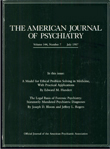Clinical factors contributing to the differential diagnosis of primary insomnia and insomnia related to mental disorders
Abstract
OBJECTIVE: Primary insomnia and insomnia related to mental disorders are the two most common DSM-IV insomnia diagnoses, but distinguishing between them is difficult in clinical practice. This analysis was performed to identify clinical factors used by sleep specialists to distinguish primary insomnia from insomnia related to mental disorders. METHOD: Clinicians evaluated 216 patients referred for insomnia at five clinical sites, rated a list of clinical factors judged to contribute to each patient's presentation, and assigned diagnoses. Analysis of variance was performed, with contributing factors as the dependent variable and diagnostic group and clinic location as independent variables. RESULTS: Sleep specialists rated a psychiatric disorder as a stronger factor for insomnia related to mental disorders and rated negative conditioning and sleep hygiene as stronger factors for primary insomnia. However, a psychiatric disorder was rated as a contributing factor for 77% of patients who received a first diagnosis of primary insomnia. CONCLUSIONS: While neither sleep hygiene nor negative conditioning is a diagnostic criterion in DSM-IV, these results support the face validity of these clinical factors distinguishing between primary insomnia and insomnia related to mental disorders. The use of a psychiatric disorder as an inclusion criterion for insomnia related to mental disorders and an exclusion criterion for primary insomnia reinforces a categorical distinction between the two diagnoses, but the contribution of psychiatric symptoms in primary insomnia appears to be a clinically relevant one. These findings suggest the need for studies on the validity of negative conditioning and sleep hygiene in the etiology of primary insomnia, as well as on the significance of psychiatric disorders, especially depression, in primary insomnia.



